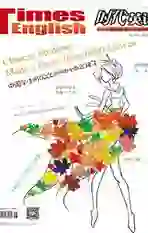词汇短语园地(3)
2018-04-14
1. abandon v. 放弃,抛弃
(1) abandon sb to sth (不顾责任、义务等)遗弃某人给……
The study showed a deep fear among the elderly of being abandoned to the care of strangers.
研究表明,老人十分害怕被丢给陌生人照管。
(2) abandon sth (to sb/sth) 不得已而放弃/舍弃
They had to abandon their lands and property to the invading forces.
他们不得不放弃土地和财产,让侵略军占领。
(3) abandon oneself to sth 陷入/沉湎于某种感情
He abandoned himself to despair.
他陷入绝望。
2. drown v. 淹死,使溺死
Two children drowned after falling into the river.
两个孩子掉进河里淹死了。
(1) drown sth in sth 把某物浸泡在……里
The fruit was drowned in cream.
水果在奶油里泡过。
(2) drown sb/sth out 压过/盖过某人/某物
She turned up the radio to drown out the noise from next door.
他开大了收音机的音量以压过隔壁房间的吵闹声。
3. last v. 持续,继续;继续存在,持续起作用,持久
The meeting only lasted (for) a few minutes.
会议只开了几分钟。
This kind of weather wont last.
这种天气持续不了多久。
Hes making a big effort now, and I hope it lasts.
现在他正加紧努力,我希望他能坚持下去。
比较:last和take的区别
last和take均表示某事持续的时间。last表示某事持续的时间,但并非一定要与表示时间的词语连用;而take表示到某地或做某事需要的时间,必须与表示时间的词语连用。
The movie lasted over two hours.
这部电影长达两个多小时。
How long do you think this storm will last?
你看这暴风雨会持续多久?
It takes (me) at least an hour to get home from work.
(我)下班回家至少得花一个小时。
How long will the flight take?
此次航班将飞行多长时间?
4. occupy v. 占领;使用,占用(空间、面积、时间等)
The capital has been occupied by the rebel army.
叛军已占领了首都。
How much memory does the program occupy?
这个程序占用了多少内存?
The bed seemed to occupy most of the room.
床似乎占去了大半个屋子。
5. wound v. 使(身体)受伤;使(心灵)受伤
About 50 people were seriously wounded in the attack.
在这次攻击中,约有50人受重伤。
She felt deeply wounded by his cruel remarks.
他那刻薄的话语使她感到深受伤害。
6. rescue v. 营救,拯救
rescue sb/sth (from sth/sb)(从某事中/某人手里)救出某
人/某物
They were eventually rescued by helicopter.
他们最后被直升机救走了。
He rescued a child from drowning.
他救起了一名落水兒童。
比较:save和rescue的区别
两者均可表示“救”,save属于普通用词,使用广泛,主要指把处于危险或危机状态中的人或物解救出来;而rescue则强调动作的迅速,指从直接的或迫在眉睫的危险中解救出来。两者常可换用。
The brave firemen saved (rescued) people from a burning house.
勇敢的消防人员从燃烧的房子里把人救出来。
The house was rescued (saved) from demolition.
这所房子保住了,可以不拆。
7. drop vt. 扔下,投下
vi. 掉下,落下;液体滴落,滴下;(价格,
劲势等)下降,下跌;累倒,累垮
I dropped the letter into the mail-box.
我将信投入信箱。
I dropped some coins into the collecting tin.
我把一些硬币投进募捐罐里了。
Tears dropped from her eyes.
泪水从她眼中滴落下来。
The price of coffee has dropped.
咖啡的价格已经降下来了。
I will work till I drop.
我要工作到我倒下为止。
1) drop back/behind 后退,落后,落在……后面
2) drop by/in/round = drop in on sb 顺便访问,顺便进入
3) drop off 打盹儿,小睡
4) drop out (of sth) 不再参加,退出,脱离
8. mess n. 混乱的局面,麻煩,困境;肮脏,杂乱
The economy is in a mess.
经济陷入了困境。
The whole situation is a mess.
整个情况都是一团糟。
The kids made a mess in the bathroom.
孩子们把浴室搞得一塌糊涂。
9. shave v. & n. 刮胡子
The nurse washed and shaved him.
护士给他洗了脸,刮了胡子。
shave sth off 刮掉某物
Charles decided to shave off his beard.
查尔斯决定刮掉胡子。
I need a shave.
我需要刮胡子了。
10. cheers int.(用于祝酒)祝你健康!
Lets drink a toast to our hostess. Cheers!
为我们的女主人举杯。干杯!
cheer n. 欢呼声,喝彩声
A great cheer went up from the crowd.
观众爆发出一阵热烈的欢呼声。
cheer v. 欢呼,喝彩,加油
We all cheered as the team came on to the field.
球队入场时我们都为之欢呼。
cheerful adj. 快乐的,高兴的,兴高采烈的
He felt bright and cheerful and full of energy.
他感到兴高采烈,浑身充满活力。
11. worthwhile adj. 值得做的,有价值的,有用的
The smile on her face made it all worthwhile.
她脸上的笑容使得这一切都非常值得。
(1) worthwhile to do sth 值得去做某事
It is worthwhile to include really high-quality illustrations.
把真正高质量的插图包括进去是值得的。
(2) worthwhile doing sth 值得做某事
It didnt seem worthwhile writing it all out again.
把它都再写出来似乎不必要。
比较:worth,worthy和worthwhile的区别
这三个词都是形容词,都有“值得”的意思,但用法或搭配关系不同。
(1) worth只能作表语,意为“值……的”“相当于……的价值的”“有……价值的”“值得……的”。由于它类似介词,须在后面接名词或动词-ing形式作宾语。
This second-hand car is worth $2000 at the most.
The exhibition is worth a visit/visiting.
Its not worth getting angry with him.
(2) worthy可作表语,也可作定语。作定语时意为“有价值的”“值得尊敬的”“应受到赏识的”;作表语时意为“值得……的”“应得到……的”,其后接of sth,也可以后接to do sth。
Guangzhou is worthy of a visit/to be visited.
He said he was not worthy to accept such honour.
The school has educated many worthy young people.
(3) worthwhile与worthy一样,既可作表语,又可作定语。表示某事因重要、有趣或从中受益大而值得花时间、金钱或努力去做,一般意为“值得的”“值得做的”“有意义的”。用作表语时,可接动名词或动词不定式。
The Summer Palace is worthwhile having/to have a visit.
